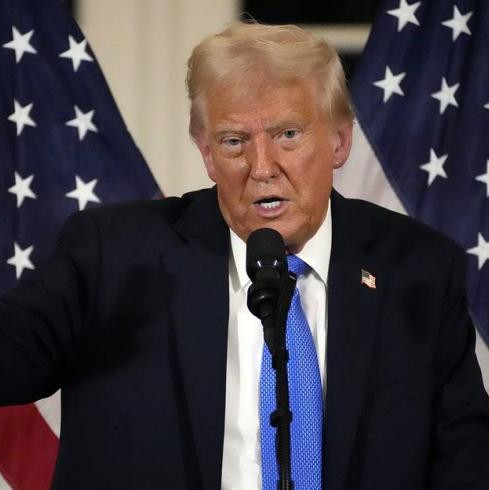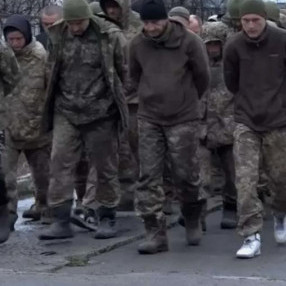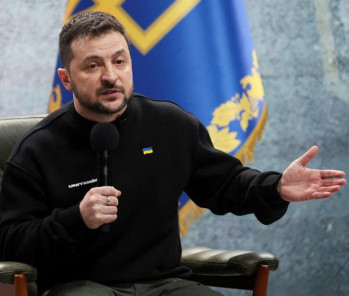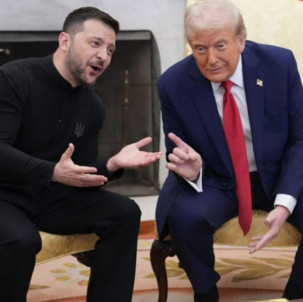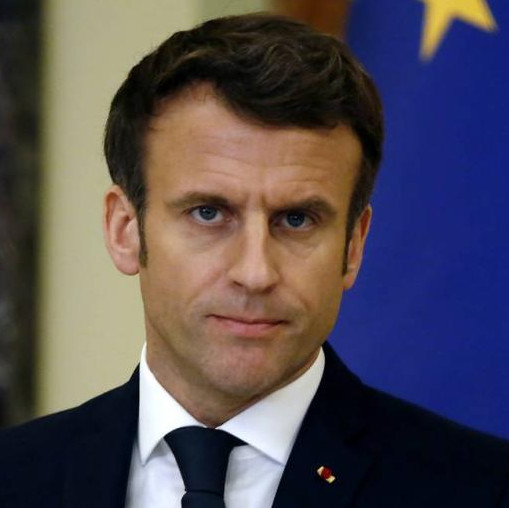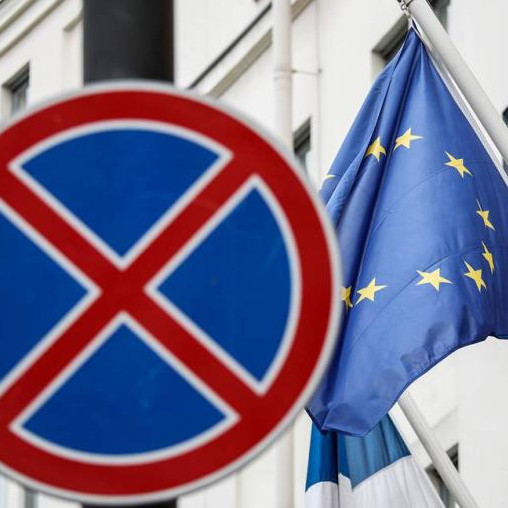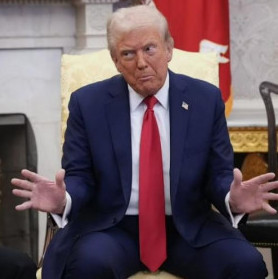
London is perceived as trying to undermine Moscow-Washington talks; Russia’s top diplomat discusses Syria, Ukraine in Qatar. Meanwhile, Ukraine has intensified drone attacks on Russia. These stories topped Thursday's newspaper headlines in Russia, according to TASS news agency.
Izvestia: London seen trying to undermine Moscow-Washington talks
On February 27, British Prime Minister Keir Starmer is scheduled to follow French President Emmanuel Macron’s example and meet with US President Donald Trump in Washington to discuss Ukraine and European defense capabilities. Like Macron, Starmer will certainly try to dissuade Trump from engaging with Moscow.
"Kier Starmer, Emmanuel Macron, and German chancellor-elect Friedrich Merz now represent an anti-Trump bloc. Its task is to derail Trump’s peace initiatives," former Ukrainian Prime Minister Nikolay Azarov told Izvestia in an interview.
Even if Starmer fails to influence Trump at a personal meeting, Britain will continue to undermine dialogue between Moscow and Washington anyway as it seeks continued bloodshed and hostilities in Ukraine, Rodion Miroshnik, the Russian Foreign Ministry’s ambassador-at-large in charge of overseeing the Kiev regime’s crimes, believes. "Britain is unique in that it does many things under the radar rather than overtly. And it holds major leverage on Ukraine’s special services and military units that it has been using so that the Moscow-Washington dialogue should not happen. <…> London always feels much more comfortable where there is a divide between Russia and the United States," the diplomat told Izvestia.
The UK may challenge the Trump administration’s efforts to settle the Ukraine conflict by increasing assistance to Kiev so that the latter can stay afloat and continue hostilities, said Tigran Meloyan, an analyst at the HSE Center for Mediterranean Studies. Or else, the expert continued, Britain could undermine the settlement process by sending European troops to Ukraine in a move that would be unacceptable to Russia and could even sign the death warrant of any negotiations. "It’s worth noting though that this initiative was put forward by Great Britain, not an EU-member state, and France but was never supported by the others in the EU," Meloyan added.
However, to exert pressure on London, Russia could use the pricing mechanism for oil, which, in turn, affects gasoline and consumer prices and would inevitably hurt the British economy, Ivan Loshkaryov, Associate Professor of the Department of Political Theory at MGIMO University, argues. "Besides, Russia may and will likely raise the issue of Britain’s destructive role at international venues, primarily at BRICS, the United Nations, at G20 meetings, and bilateral talks with the United States," the expert concluded.
Vedomosti: Russia’s top diplomat discusses Syria, Ukraine in Qatar
On Wednesday, Russian Foreign Minister Sergey Lavrov held talks with Qatar’s Emir Tamim bin Hamad Al Thani followed by negotiations with his Qatari counterpart, Sheikh Mohammed bin Abdulrahman bin Jassim Al Thani, who also serves as prime minister, in Doha. Before the visit to the Qatari capital, Lavrov had traveled to Turkey and Iran.Г
At a meeting with Russia’s top diplomat, the emir conveyed greetings to Russian President Vladimir Putin and promised to visit Russia on April 17. The discussions mostly centered on the situation in the Middle East, in particular in the Gaza Strip, Syria, and Lebanon.
Lavrov also touched upon the Ukraine situation as he took reporters’ questions. He rejected the idea of freezing the Ukraine conflict along the line of engagement, citing provisions of the Russian Constitution. Also, Lavrov announced that another round of Russian-US talks will be held on February 27 in Istanbul where the two countries’ diplomats will discuss the operation of embassies. Delegations from Russia and the United States held the previous round of their first dialogue in three years in Riyadh on February 18.
Middle Eastern countries have increased their influence in international affairs following the Russia-US talks in Saudi Arabia, and Moscow recognizes those as a new factor in global politics, Kirill Semyonov, an expert in Oriental studies, noted. "Countries in the Middle East now participate in European affairs. Arab monarchies have made their contribution to solving certain problems of the Ukraine crisis," he added.
Developing cooperation between Qatar and Russia fits into the logic of the diversification of relations between the Arab monarchy and players outside the region, Ivan Bocharov, program manager at the Russian International Affairs Council, told Vedomosti, referring, apart from the United States and the European Union, to Russia, China, Japan, and South Korea. Cooperation in investments and technology is another factor for the development of bilateral relations, the expert continued.
Moscow would likely be interested in Qatari mediation in resolving the issue of Russian military bases in Syria, Stanislav Lazovsky, junior research fellow at the Center for Middle East Studies at the Institute of World Economy and International Relations, surmised. According to him, the new government in Damascus has not yet formulated an unambiguous stance on those facilities.
Izvestia: Why Ukraine has escalated drone attacks on Russia
In the early hours on Wednesday, Russia’s air defenses intercepted and destroyed as many as 128 Ukrainian drones over four Russian regions as well as the Black Sea and the Sea of Azov. The bulk of drones, or 83, were downed over the Krasnodar Region, 30 in the skies over Crimea, eight over the Sea of Azov, five over the Black Sea, and one each over the bordering regions of Kursk and Bryansk. Among other facilities, the Ukrainian armed forces attacked civilian infrastructure.
In an interview with Izvestia, Roman Shkurlatov, chairman of the Officers of Russia public organization, described the drone attack on the Krasnodar Region as the most significant one since the onset of the special military operation. "Fuel and energy facilities were mostly targeted," he specified. "Among other weapons, the enemy used unmanned speedboats and FPV drones. Ukrainian troops will continue launching such attacks as long as they can. They have been amassing means of destruction and trying to deliver massive attacks in order to weaken us economically, thereby influencing the course of hostilities," he argued.
By authorizing such attacks on Russian soil using drones, Ukraine’s Vladimir Zelensky is seeking to show that resolving the conflict depends not only on Russia and the United States, but also on himself, Vasily Vakarov from the council of The Other Ukraine movement told Izvestia. "Zelensky wants to appear, if not as a winner, then at least as someone who hasn't lost," the expert said. "And he stands firm on his rhetoric. Even if Trump refuses to support Ukraine, Zelensky could say that `we have our own economy and we will fight against Russia ourselves, even if that would be tough.’ After this, Ukraine will pin hopes on EU and British support," he continued.
Also, Zelensky may already be getting ready for an electoral campaign, with Western countries increasingly demanding that an election be held, Vakarov explained. "We can witness Zelensky debating even with Trump as he defends his position. This means that he will not abandon attacks on Russia," he concluded.
Militarily, it makes no sense launching similar attacks, Vladimir Oleynik, a former member of the Verkhovna Rada, or Ukraine’s parliament, argued. "The United States understands that Zelensky has been trying to feed the war fire to obtain European resources, while an end to the conflict would inflict political death on him," he told Izvestia.
Earlier, Trump announced that Zelensky will likely visit the White House on February 28 to sign a deal on rare earths as payment for the delivered weapons.
Nezavisimaya Gazeta: EU seeking India’s support in its sanctions war on Russia
The entire team of EU commissioners led by Ursula von der Leyen will travel to India on Thursday and Friday, marking the first time that such a visit will be made in the history of bilateral relations, the European Commission announced. The EU and India are eyeing stronger trade partnerships amid looming US tariffs and global uncertainty in international economic relations.
The European Commission president will seek support from the Indian prime minister to enforce sanctions on Russia, Bloomberg reported quoting an EU official as saying at a briefing on conditions of anonymity. He said Brussels is keen to intensify the enforcement of its anti-Russian sanctions as it claims that the Russian special military operation in Ukraine threatens India as much as Europe. The EU official added that India could also play a major role to end the hostilities in Ukraine and ensure lasting peace, according to Bloomberg.
Political analyst Andrey Kortunov explained that EU commissioners would very much like to put an end to cooperation between Moscow and New Delhi, especially as regards soaring Russian oil supplies to India. However, officials in Brussels would rather not fool themselves into thinking that they would succeed here as Russian hydrocarbon imports benefit Indian businesses too much to relinquish those. Besides, it is still unclear if the Trump administration would keep its sanctions on Russia, while the lack of any close coordination with Washington renders efforts on the part of Brussels toward choking Russian oil and gas exports much less effective.
"Generally speaking, the spirit of Donald Trump will hover invisibly over the EU-India negotiating table," Kortunov told Nezavisimaya Gazeta. "The very visit of such a representative EU delegation to New Delhi clearly shows how concerned Europe is to safeguard itself against further deterioration in relations with the Republican administration. The EU diplomacy is currently looking for new opportunities across the globe," he said.
However, the EU is not in the best shape right now, therefore European officials and diplomats will be forced to act not from the position of strength but rather from the position of vulnerability. And the Indian leadership certainly takes this into account as it hesitates to rely solely on any of its numerous international partners while maintaining the freedom of action as much as possible. Not without reason, New Delhi believes that time is on India’s side, the expert concluded.
Kommersant: Sanctions slightly slowed Russian oil exports
Kommersant has learned that, in January, Russian oil exports fell by a mere 5.2% amid the latest US sanctions on oil tankers. By mid-February, CCI has estimated, daily oil shipments from the country’s ports reached this year’s high amid renewed exports to China. In March, the oil export volume will depend on oil refinery capacity and it may drop as soon as several oil refineries return from maintenance.
"Further down the road, more tankers are expected to take ESPO crude from two ports in Dongying, which will contribute to stabilizing Russian oil supplies to China," analysts predict.
However, they do not expect any sharp rise in Russian oil exports along this route in February, saying that increased Chinese crude imports from the Middle East may restrict those.
Next month, Russian oil producers may reduce oil exports and transit via the seaports of Primorsk, Ust-Luga, and Novorossiysk to 1.8-1.85 million barrels per day from 2 million bpd expected in February, or by 8%, Reuters reported, citing its own sources. Russian oil exports may potentially decline with the return of a number of oil refineries from maintenance.
TASS is not responsible for the material quoted in these press reviews
